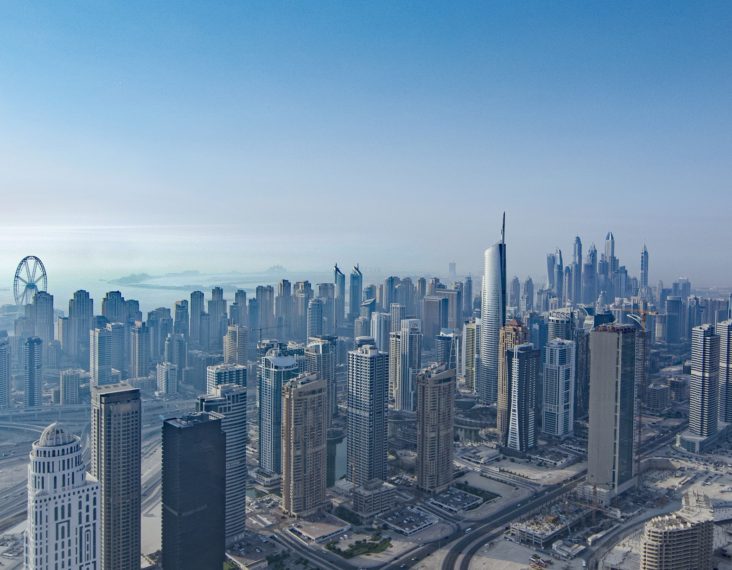Dubai’s Non-Oil Foreign Trade Rises 6 Percent To AED1.37 Trillion In 2019

Dubai saw remarkable external trade growth in 2019, spurred by its efforts to achieve its 2025 trade target of AED2 trillion. Non-oil external trade last year grew 19 percent in volume from 91 million tons in 2018 to reach 109 million tons in 2019. Re-exports rose by a record 48 percent to reach 17 million tons, while exports rose by 45 percent to 19 million tons and imports grew by 9 percent to 72 million tons.
These figures capped a prosperous decade for Dubai from 2010-2020, during which external trade grew by 70 percent.
Dubai’s strong foreign trade performance, which reflects its robust economic fundamentals and its resilience against odds, gave it a positive start to the year 2020 – the year of preparation for the next 50 years.
Dubai achieved exceptional external trade growth in 2019 despite the headwinds from an intensified global economic downturn. In terms of value, Dubai’s external trade surged 6 percent to AED1.371 trillion from AED1.299 trillion in 2018. Exports skyrocketed 22 percent to AED155 billion, re-exports grew by 4 percent to AED420 billion and imports rose by 3 percent to AED796 billion. Over the decade (2010-2019), the value of Dubai’s external trade went up by 52 percent thanks to the agility, versatility and flexibility of the external trade sector in the emirate, which discovered alternative markets and trade paths to make up for sluggish growth in some markets.
Commenting on the growth, H.H. Sheikh Hamdan bin Mohammed, Crown Prince of Dubai and Chairman of the Executive Council, said: “Dubai’s external trade has contributed significantly to the emirate’s economic achievements, further raising its status as a global hub for trade, business and tourism, giving it a solid platform for growth in the next 50 years and creating the optimal conditions for more sustainable development across sectors.
“Inspired by the vision of His Highness Sheikh Mohammed bin Rashid Al Maktoum, Vice President, Prime Minister and Ruler of Dubai, Dubai’s external trade sector is progressing steadily towards the 2025 trade target of AED2 trillion set by His Highness. All government entities are working seamlessly together to provide the best services, facilitate trade and foreign investments, and further develop infrastructure across the emirate, especially at airports and free zones, to galvanise its journey of excellence and enhance its role as a commercial bridge between the east and west. Furthermore, hosting mega-events such as EXPO 2020 will provide opportunities for the international trade sector to explore new possibilities and expand growth.”
Dubai’s foreign trade out of free zones in 2019 was a major contributor to the overall increase, accounting for AED592 billion, a 11 percent increase year-on-year. Direct trade saw 2 percent growth to reach AED770 billion. Customs warehouse trade hit AED9 billion.
Land trade grew by 11 percent contributing AED228 billion, air trade rose by 5 percent to AED641 billion and sea trade increased by 4 percent to AED502 billion.
Sultan bin Sulayem, DP World Group Chairman & CEO and Chairman of Ports, Customs and Free Zone Corporation, said: “Growth in Dubai’s external trade is the fruit of dedicated and well-planned work over the last few years, which helped us establish global leadership in different sectors. The future is promising and there are no limits when it comes to our expectations. We will keep growing and developing based on the latest and most advanced innovations and breakthroughs in AI smart applications following the vision and directives of our leadership.
“Hosting major international events will give our organisations a greater voice on the world stage, backed by our presence and strong network out of the 80 terminals that DP World operates worldwide, and our bold economic initiatives including the Dubai Silk Road.”
Bin Sulayem added: “Free zones in Dubai are a key factor behind the emirate’s trade success. The sophisticated infrastructure of our free zones, especially Jebel Ali Free Zone, JAFZA, has helped businesses benefit from different incentives and facilities, and attracted more foreign investments over the years.”
Bin Sulayem said Dubai Customs is continuously evolving to facilitate greater trade and provide more exceptional service to its customers. The number of customs transactions completed by Dubai Customs grew by a record 34 percent in 2019 to 13 million from 9.7 million in 2018. As part of the Dubai Silk Road strategy, Dubai Customs launched the World Logistics Passport, which links Customs World, DP World, and Emirates Group to enhance connectivity through Dubai and, through sharing of expertise and process development directly between partner countries. Dubai Customs also launched the second phase of the productivity engine, an initiative developed in-house and approved by The Executive Council with the aim of boosting productivity by 8 – 10 percent.
China remained Dubai’s largest trading partner, contributing AED150 billion. India was the second biggest trading partner, contributing AED135 billion, followed by the USA with AED77.7 billion, and Switzerland with AED60 billion.
Saudi Arabia maintained its position as Dubai’s largest Arab trade partner. The country was the emirate’s fifth biggest partner globally, contributing AED56 billion.
The highest traded commodity by value in 2019 was gold, jewelry and diamonds which contributed AED370 billion, a growth of 7 percent from 2018. Gold took the lion’s share of trade with AED169.5 billion, followed by phones with AED164 billion, an increase of 9 percent from the previous year. The third-highest traded commodity was jewelry at AED116.6 billion, followed by petroleum oils which contributed AED85.4 billion in 2019, a growth of 55 percent, and diamonds which accounted for AED83.9 billion.


